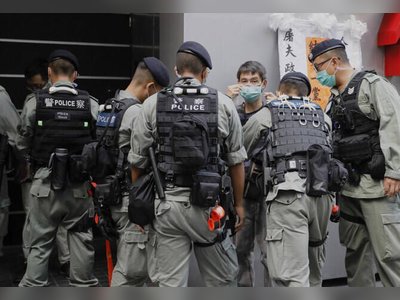
Trump tariffs would hit Hungary hard despite warm relations with MAGA-friendly Orbán
Despite close political ties and a shared cultural and nationalistic agenda, Hungary is expected to be among the EU countries most affected by US President Donald Trump's newly announced tariffs on the European Union.
BUDAPEST: Hungary’s populist prime minister has spent years building a close political relationship with US President Donald Trump and aligning himself with the MAGA movement.
But despite Viktor Orbán’s success in gaining favor with the culturally conservative and nationalist wing of Trump’s administration, his country is poised to be among those hard hit by Trump’s tariffs against the European Union.
Trump earlier this month announced he would levy tariffs of 30 percent against Mexico and the EU beginning Aug. 1 — a move that could cause massive upheaval between the United States and the 27-member EU, of which Hungary is a member.
As a small, export-oriented economy with major automobile, pharmaceutical and wine industries — some of the main categories of products Europe exports to the US — Hungary will be particularly vulnerable to Trump’s tariffs.
The duties “would put the Hungarian economy in a very, very difficult situation, because then the entire possibility for Hungary to export to America would be essentially eliminated,” Péter Virovácz, chief analyst at ING Hungary, told The Associated Press.
Hungarian companies export their goods across the Atlantic.
Outgoing trade to the United States represents around 15 percent of all Hungarian exports to countries outside the EU.
One such enterprise, a Budapest-based company specializing in Hungarian wine, said it will likely cease doing business in the US altogether if the 30 percent duty is levied on its products.
If it’s really going to be 30 percent, then there is no more shipment ...
We might just call it a day at the end of the year,” said Gábor Bánfalvi, co-owner of Taste Hungary.
In total, the value of EU-US trade in goods and services in 2024 amounted to 1.7 trillion euros ($2 trillion).
Doubts that political ties could soften the blow Hungary’s government has acknowledged that the tariffs would present a challenge.
But, careful not to criticize the Trump administration, it has instead blamed the EU for failing to reach a comprehensive trade agreement with Washington.
Confident that his right-wing populist policies would help win him favor with Trump’s administration, Orbán said in an interview in April that while tariffs “will be a disadvantage,” his government was negotiating “other economic agreements and issues that will offset them.” But Péter Krekó, director of the Budapest-based Political Capital think tank, expressed doubt that political affinities could play a meaningful role in mitigating damage to Hungary’s economy caused by Trump’s trade policy.
The manufacturing of cars and motor vehicle parts represents an “overwhelming majority” of the country’s total exports.
Pharmaceuticals make up an even larger share of Hungarian exports to the United States — an industry on which Trump this month threatened to impose 200 percent tariffs.
That “will essentially kill European and thus Hungarian exports to America,” Virovácz said.
It’s impossible for tariffs to be levied on EU products but not on Hungarian ones,” he said.
Krekó, the political analyst, said Trump’s administration “gives practically nothing for free.
If Hungary ...
cannot fulfill the interests of the US, then I think Hungary is not going to receive gifts.”
But despite Viktor Orbán’s success in gaining favor with the culturally conservative and nationalist wing of Trump’s administration, his country is poised to be among those hard hit by Trump’s tariffs against the European Union.
Trump earlier this month announced he would levy tariffs of 30 percent against Mexico and the EU beginning Aug. 1 — a move that could cause massive upheaval between the United States and the 27-member EU, of which Hungary is a member.
As a small, export-oriented economy with major automobile, pharmaceutical and wine industries — some of the main categories of products Europe exports to the US — Hungary will be particularly vulnerable to Trump’s tariffs.
The duties “would put the Hungarian economy in a very, very difficult situation, because then the entire possibility for Hungary to export to America would be essentially eliminated,” Péter Virovácz, chief analyst at ING Hungary, told The Associated Press.
Hungarian companies export their goods across the Atlantic.
Outgoing trade to the United States represents around 15 percent of all Hungarian exports to countries outside the EU.
One such enterprise, a Budapest-based company specializing in Hungarian wine, said it will likely cease doing business in the US altogether if the 30 percent duty is levied on its products.
If it’s really going to be 30 percent, then there is no more shipment ...
We might just call it a day at the end of the year,” said Gábor Bánfalvi, co-owner of Taste Hungary.
In total, the value of EU-US trade in goods and services in 2024 amounted to 1.7 trillion euros ($2 trillion).
Doubts that political ties could soften the blow Hungary’s government has acknowledged that the tariffs would present a challenge.
But, careful not to criticize the Trump administration, it has instead blamed the EU for failing to reach a comprehensive trade agreement with Washington.
Confident that his right-wing populist policies would help win him favor with Trump’s administration, Orbán said in an interview in April that while tariffs “will be a disadvantage,” his government was negotiating “other economic agreements and issues that will offset them.” But Péter Krekó, director of the Budapest-based Political Capital think tank, expressed doubt that political affinities could play a meaningful role in mitigating damage to Hungary’s economy caused by Trump’s trade policy.
The manufacturing of cars and motor vehicle parts represents an “overwhelming majority” of the country’s total exports.
Pharmaceuticals make up an even larger share of Hungarian exports to the United States — an industry on which Trump this month threatened to impose 200 percent tariffs.
That “will essentially kill European and thus Hungarian exports to America,” Virovácz said.
It’s impossible for tariffs to be levied on EU products but not on Hungarian ones,” he said.
Krekó, the political analyst, said Trump’s administration “gives practically nothing for free.
If Hungary ...
cannot fulfill the interests of the US, then I think Hungary is not going to receive gifts.”











